- Home
- Salman Rushdie
The Ground Beneath Her Feet Page 7
The Ground Beneath Her Feet Read online
Page 7
Wink or no wink, Homi was telling the simple truth, for in addition to being a member of every worthwhile club in the city, from the (now-defunct) Wellesley to the Governors of the Mahalaxmi Racecourse, he had also, during those days of scarcities, made a rogues fortune by cornering the market in cement, and also from a chain of bootleg stills and illegal speakeasies. It is said that Homi Catrack was the first man to use the term “parallel economy” and that his stashes of black money would, if piled high, have formed an edifice larger than the Gateway of India. It is one of the paradoxes of human nature that this same Homi, who profited so greatly from the turmoil of the 1940s, was one of the greatest admirers of the “honest men who would clean up India,” as he called the Congress leadership. His rage at Gandhi’s arrest was genuine and intense.
In the locker room after a keen contest which, for once, he had narrowly won, Sir Darius Xerxes Cama was in generous mood, imagining himself in ancient Greece or Persia, sweating among philosophers, discoboli, chariot racers, sprinters, maguses and kings. In the grip of such a reverie, he was inclined to forgive a wink, and an invitation to the future seemed appropriate enough. “Very well,” he glowered, tolerantly. “Let us see what type of scum is presently rising to the top.”
The future turned out to be a bunch of bohemians, painters, writers and movie people, who gathered to drink whisky and discuss civil disobedience in Homi’s substantial apartment (with partially obstructed sea view) in an Art Deco apartment block called Côte d’ Azur on Warden Road. Within minutes Sir Darius Xerxes Cama knew it had been a mistake to come. He felt like a visitor from the moon, an alienated alien, unable to breathe this heady, illicit air. He moved uncertainly at the fringes of the night, largely ignored in spite of his striking physical presence—the fez, the moustache, the long frock coat, the natural physical grace of his movements, the fierce shine of power in his eyes: human power, that is, the force that comes from a man’s nature and cannot be learned, or bought, or bestowed.
Clusters of intellectuals had formed around certain beautiful women—the starlet Pia Aziz, the artist Aurora Zogoiby—while most of the other women in the room were sitting at the feet of a boozy but celebrated Muslim writer of low-life stories who was shocking them by providing, in the most exquisite and ornate Urdu Sir Darius Xerxes Cama had ever heard, detailed and hair-raising descriptions of the worst things in the world, undisguised by circumlocution, unfettered by good taste. He spoke naturally in that famous glittering prose which was somehow both voluptuous and precise, at once dainty and appalling, telling tales of the degraded interiors of the local insane asylums, of the brutal murders and casual rapes that were the city’s hidden news, of the corruption of those in authority and the violence in the hearts of the poor, of incestuous love affairs in high society and the killing of daughters in the slums, of the caged whores of Falkland Road and of the mafias who ran the city’s organized crime as well as its prostitution and would order men’s penises to be severed as casually as they would call for a bunch of red bananas in the bazaar. The contradiction between the high jewellery work of the writer’s language and the pornographic nature of his material left Sir Darius more shocked and revolted than he felt able to show. Also, of course, he was rather more familiar with some of the storyteller’s source material than he cared to reveal.
He turned away and half collided with the only Englishman at the gathering. It was William Methwold, whom he hadn’t seen in years. “And how do you come to be here?” Sir Darius in his unnerved condition found himself speaking more bluntly than was polite, and immediately attempted to apologize. “I’m afraid I’m out of sorts,” he began, but Methwold stopped him, and greeted him with evident affection.
“I’m a little disoriented myself,” he said. “But then that’s our destiny, as most of the assembled company would readily agree. And to answer your question, I have a house Mr. Catrack wants to buy. And there will come a time when I want to sell it.”
They left it at that and began to drink seriously. Human history clanked along, and the hot, blind stars wheeled overhead. They mentioned neither Homer nor Max Müller, neither the Ramayana nor Dumézil. It was a night for whisky and defeat. Sir Darius Xerxes Cama forgot his wife waiting for him in the Apollo Bunder apartment, forgot his sleeping sons, forgot where he was, forgot himself, drank too heavily, and at a certain point he tore open his shirt and, bellowing out the words of “Let’s Do It (Let’s Fall in Love),” introduced the gathering to the gentle art of Musical Muscle Control. His fellow guests fell silent; even the obscene writer’s oral narratives were stilled; and when Sir Darius Xerxes Cama finished, with a blurted “Mens sana in corpore sano,” he understood in spite of his drunken stupor that what was acceptable among the bread-roll-hurling, jolly-jape-urinating, Eton-and-Oxford, men-only Freemasonry of the last years of British India had led, on this occasion, in more radical, and mixed, society, to his making a great ass of himself. Nobody spoke for a long moment, though there were several suppressed giggles and loud, irrepressible snorts of joy. Then Aurora Zogoiby, that damned painter woman with the sharp tongue, spoke up loud and clear, and stabbed him in the heart.
“Quoteofy your Latin tags by all means, Daryoosh darling,” she drawled, “but the general opinion round here is that this corpore of yours is stark raving insano. As, quite possibly, Sir Circus Camasaurus, are you.”
Sir Darius Xerxes Cama never met Aurora Zogoiby again. They lived in a great city, a metropolis of many narratives that converged briefly and then separated for ever, discovering their different dooms in that crowd of stories through which all of us, following our own destinies, had to push and shove to find our way through, or out. In Bombay the stories jostled you in the street, you stepped over their sleeping forms on the sidewalks or in the doorways of pharmacies, they hung off the local trains and fell to their deaths from the doors of B.E.S.T. buses or—once upon a time but no more—under an onrushing tram. Aurora the painter forgot the inebriated lawyer soon enough, never gave him another thought, but Sir Darius carried her words to the grave, like a spear.
He came to a decision. Homi Catrack and his vaunted “future” had nothing to offer him. He would dissociate himself from them both. He was, after all, a clown, a dinosaur, a species on the verge of extinction. Something immense was about to strike his world, and the cloud the impact threw up would obliterate the likes of him. Very well. Let it be so. He would make of his remaining days a lament for the mistakes of progress and the failure of the young to learn the lessons of the past. He would be a terror, as the great lizards had been, the terror of the earth, until the long night fell.
He was a natural leader of men caught in a dead end of history and deprived of followers. Where he led was backwards, in a direction nobody wanted to go. He was a father who loved his sons and came to be hated by all of them because of the harangue that never ended, the critique that reached no final summation but surged on through the days of their youth, while they, swimmers caught by the mighty wave of his disappointment, fought for breath and feared at every moment that they might drown.
And Ormus Cama, who ran furthest from his shadow, was the child most shaped by him, the only one in all the family who would always secretly acknowledge his own kinship with his father’s exhibitionist streak, and of course his muscles’ vulnerability to cheap music, which made them bop and twitch.
My own mother, Mrs. Ameer Merchant, correctly prophesied a further problem for young Ormus. While everyone’s attention was focused on the accident to Virus, on Cyrus’s murderous streak, on the mystical absentness of Lady Spenta and the decay of Sir Darius, it was Ameer who kept her eye on the ball. “It is not Cyrus or Virus who is that boy’s twin,” she pointed out. “The disaster that sealed his fate didn’t happen on any cricket pitch but inside his mother, before he was even born.” For many years after Ormus and I unexpectedly became pals, in spite of the ten-year difference in our ages, my mother would return to her theme. “Born in his dead brother’s shadow,” she would say,
tut-tutting, shaking her head. “He never could get out of it. Doesn’t matter how far he ran, that dead boy’s shadow was stuck hard to his heels. Doesn’t matter that he ran right round the world a hundred and one times. His fate was sealed there and then, before he took one step down his bad-mash road.”
Such were the factors that detached Ormus Cama from the ordinary ties of family life. The ties that strangle us, which we call love. Because of the loosening of these ties he became, with all the attendant pain of such becoming, free.
But love is what we want, not freedom. Who then is the unluckier man? The beloved, who is given his heart’s desire and must for ever after fear its loss, or the free man, with his unlooked-for liberty, naked and alone between the captive armies of the earth?
My mother’s intuition proved to be correct. Born in his dead twin’s shadow, Ormus Cama turned out to be what the ancients called a psychopomp, one concerned with the retrieval of lost souls, the souls of the beloved dead. As he grew older, he began to suffer from the family affliction of silence, of inwardness. In the beginning, until the miracle of the music, he feared, but could do nothing to resist, these spells of what he called “Cama obscura.” During these “darknesses,” Ormus would lie still, with his eyes shut, for hours on end, while the purple stain on his eyelid seemed to be searching the empires of the unseen, probing the depths of the worlds that lay concealed beneath the surface of the apparent, hunting (and eventually finding) Gayomart.
After the death by spearing of mortal Castor, Polydeuces the son of Zeus spent alternate days below the earth with his dead brother, at a place named Therapne; and in return the dead twin was allowed to spend alternate days with his brother on the surface, with the ground beneath his feet instead of over his head. Gayomart Cama did not return, however; unless it was in the form my mother named, as Ormus’s shadow, conceived of as something like that roguish, independent silhouette which once escaped from Peter Pan until sewn back to his feet by Wendy Darling. For it was true that Ormus had shadow selves, the many Others who plagued and came to define his life. It might not be so fanciful (my own nature has a weakness for fancy) to say that his dead twin was, in the shifting shape of Ormus’s monochrome, protean shade, still alive.
“My little Ormie,” Lady Spenta Cama had once greeted her unexpected son. “My little shrimpy boy. Now you’re safe from Hell. Now they can’t open up the ground and take you down.” But Lady Spenta was wrong about the ground beneath his feet. I’m not saying that he was carried by demons down to some ancient supernatural inferno. No, no. But chasms did open. They can, and did. They consumed his love, stole his Vina from him and would not give her up. And they did send him, as we shall see, all the way to Hell and back.
The ground, the ground beneath our feet. My father the mole could have told Lady Spenta a thing or two about the unsolidity of solid ground. The tunnels of pipe and cable, the sunken graveyards, the layered uncertainty of the past. The gaps in the earth through which our history seeps and is at once lost, and retained in metamorphosed form. The underworlds at which we dare not guess.
We find ground on which to make our stand. In India, that place obsessed by place, belonging-to-your-place, knowing-your-place, we are mostly given that territory, and that’s that, no arguments, get on with it. But Ormus and Vina and I, we couldn’t accept that, we came loose. Among the great struggles of man—good/evil, reason/unreason, etc.—there is also this mighty conflict between the fantasy of Home and the fantasy of Away, the dream of roots and the mirage of the journey. And if you are Ormus Cama, if you are Vina Apsara, whose songs could cross all frontiers, even the frontiers of people’s hearts, then perhaps you believed all ground could be skipped over, all frontiers would crumble before the sorcery of the tune. Off you’d go, off your turf, beyond family and clan and nation and race, flying untouchably over the minefields of taboo, until you stood at last at the last gateway, the most forbidden of all doors. Where your blood sings in your ears, Don’t even think about it. And you think about it, you cross that final frontier, and perhaps, perhaps—we’ll see how the tale works out—you have finally gone too far, and are destroyed.
“At the frontier of the skin.” They made a song about it, as they did about everything. You remember it. You remember the nasal elongation of his phrasing, and above and behind him the high purity of her voice. You remember his words, her words. If you remember the music the words are impossible to forget. At the frontier of the skin no dogs patrol. That was it. At the frontier of the skin. Where I end and you begin. Where I cross from sin to sin. Abandon hope and enter in. And lose my soul. At the frontier of the skin no guards patrol.
Yeah, but there was a second verse. At the frontier of the skin mad dogs patrol. At the frontier of the skin. Where they kill to keep you in. Where you must not slip your skin. Or change your rôle. You can’t pass out I can’t pass in. You must end as you begin. Or lose your soul. At the frontier of the skin armed guards patrol.
Vina Apsara, the beautiful, the dead. Her very name, too good for this world. Vina, the Indian lyre. Apsara, from apsaras, a swanlike water nymph. (In Western terms, a naiad, not a dryad.) Look out, Vina. Nymph, watch your step. Beware the ground beneath your feet.
3
LEGENDS OF THRACE
Nobody in my family could sing a note, let alone hold a line or carry a tune. Nor could any of us produce a credible sequence of musical sounds by any other means. No string instruments were played, no flutes blown, no keyboards thumped. We couldn’t even whistle. From deep within the dusty trunk of childhood I can still dig out the memory of my mother Ameer when young, Ameer on our Cuffe Parade verandah, sitting on a low stool facing the sea, with an old-fashioned churn between her knees, making mango ice cream and trying, unwisely, to whistle while she worked. The churning and the whistling made for hard, hot labour, they furrowed and moistened her high-arched brow, but when I tasted the result of her struggles I gagged and retched; her off-key siti-bajana had curdled my favourite dessert. I begged her to desist in future, knowing she would not. “Ma, keep mum.” “Silent ice is wholly nice.” “Ice cream not youce cream.” And, parodying the Kwality brand’s famous slogan, “A dream without scream.”That was how we spoke, my mother and I: in puns and games and rhymes. In, you might say, lyrics. This was our tragedy. We were language’s magpies by nature, stealing whatever sounded bright and shiny. We were tinpan alleycats, but the gift of music had been withheld. We could not sing along, though we always knew the words. Still, defiantly, we roared our tuneless roars, we fell off the high notes and were trampled by the low ones. And if bitter ices were the consequence, well, there were worse fates in the world than that.
Villa Thracia, where I was raised, was one of the series of wedding-cake fantasy bungalows that formerly lined that gracious promenade like proud courtiers standing in a row before their queen, the sea. On Cuffe Parade in the cool of Bombay evenings, the city’s strollers, complete with kids and pets, would come out to amble and flirt and “eat the air.” From itinerant vendors they would buy channa for the children, Gold Flake cigarettes for the gents, and fragile garlands of chambeli flowers to wind into the ladies’ hair. My memories of that childhood home seem now like dreams of Olympus, of a sojourn with the gods in the days before I was cast out into the world. Clutching at what remains of the past, I hear its spooky laughter as it eludes me. I snatch at wisps of faery dresses but yesterday’s creatures no longer return. I must do the best I can with echoes.
That Cuffe Parade has gone now, and the process of its going was assisted, if one believes certain unsubstantiated suggestions regarding the laying of a fire, by the young Vina Apsara; and what Vina may or may not have facilitated was completed by my mother, who loved the city but for whom the future was a force more powerful than love. Cities are not immortal; nor are memories; nor are gods. Of the deities of childhood’s Olympus, hardly any now remain.
For many Indians, our parents are as gods. Vina, who had most reason to deny her parentage, took to saying
, at the height of her fame and after reading Erich von Däniken, that her true ancestors had been godlike entities who arrived in silver chariots from outer space, tall, lucent, androgynous beings one of whom had extruded her painlessly from “her” navel. “They watch over me always,” she told more than one bewildered reporter. “I am in permanent contact. Permanent.” In those days she was presenting herself as an androgynous alien on stage as well as off, and no doubt such guff was good for business. But I could hear the savagery beneath her airhead quotes. I could hear the goat songs of her past.
(“Goat songs”? Excuse me. A literal translation, from the Greek, of a more familiar word: “tragedies.” And Vina’s story, with its echoes of the high old yarns of, oh, Helen, Eurydice, Sita, Rati and Persephone—tall Vina’s tall tale, which in my circumambulatory way I am hastening to tell, certainly had a tragic dimension. But it also had a good deal to do with goats.)
If our parents are to be thought of as godlike, might the gods actually be our parents? Tales of divine paternity began, let us agree, at the beginning of things, and will end only at the end of time. As I learned in boyhood from my father, the gods themselves quarrelled over the “putative procreative interventions” of other deities. Shiva, suspecting that the new-born Ganesh might not be his son, struck off the baby’s head; then remorse set in, and in a panic, he replaced the lost head with the first that came to hand: viz., the trunker’s noddle we know and love today. And who was the father of Orpheus, by the by; Apollo the glorious Sun God, or merely Oeagrus, ruler of the outlying, the more than somewhat hickish, province of Thrace? For that matter, who was the father of Jesus Christ?

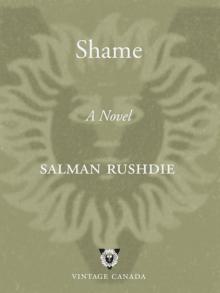 Shame
Shame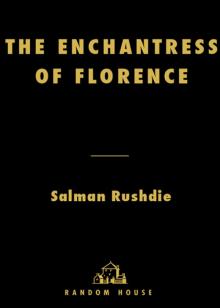 The Enchantress of Florence
The Enchantress of Florence Imaginary Homelands: Essays and Criticism 1981-1991
Imaginary Homelands: Essays and Criticism 1981-1991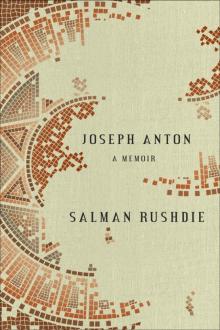 Joseph Anton: A Memoir
Joseph Anton: A Memoir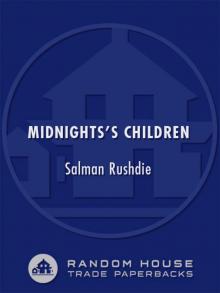 Midnight's Children
Midnight's Children East, West: Stories
East, West: Stories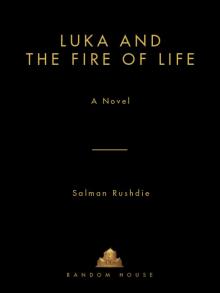 Luka and the Fire of Life
Luka and the Fire of Life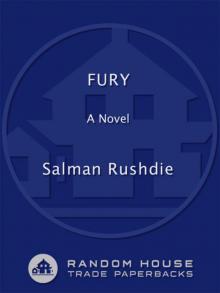 Fury Fury Fury
Fury Fury Fury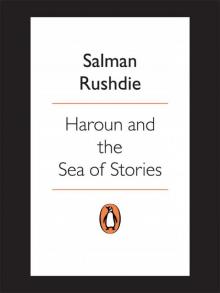 Haroun and the Sea of Stories
Haroun and the Sea of Stories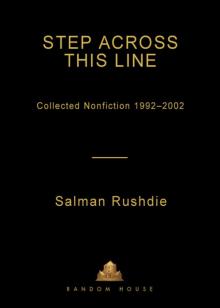 Step Across This Line: Collected Nonfiction 1992-2002
Step Across This Line: Collected Nonfiction 1992-2002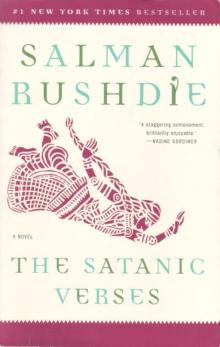 The Satanic Verses
The Satanic Verses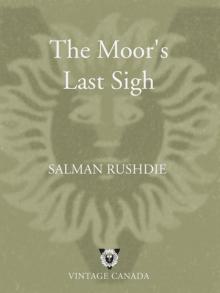 The Moor's Last Sigh
The Moor's Last Sigh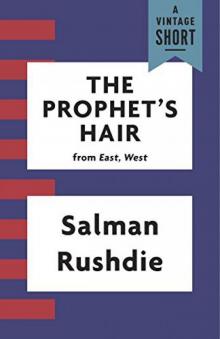 The Prophet's Hair
The Prophet's Hair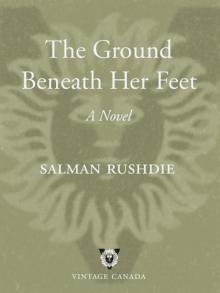 The Ground Beneath Her Feet
The Ground Beneath Her Feet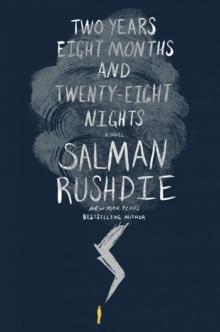 Two Years Eight Months and Twenty-Eight Nights
Two Years Eight Months and Twenty-Eight Nights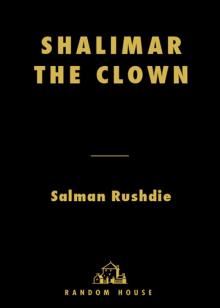 Shalimar the Clown
Shalimar the Clown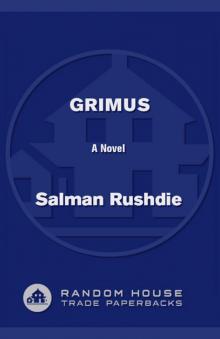 Grimus
Grimus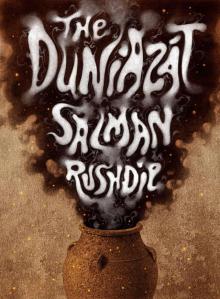 The Duniazát
The Duniazát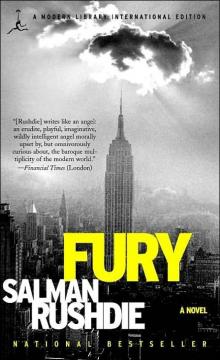 Fury
Fury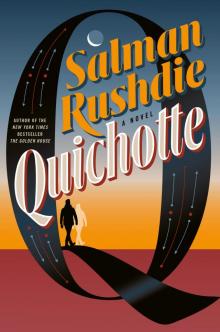 Quichotte
Quichotte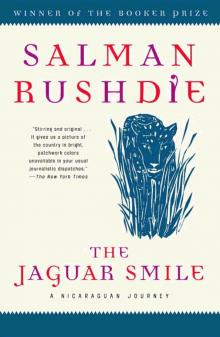 The Jaguar Smile
The Jaguar Smile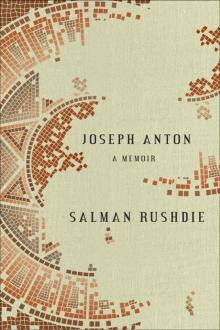 Joseph Anton
Joseph Anton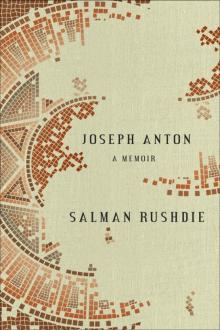 Joseph Anton: A Memoir: A Memoir
Joseph Anton: A Memoir: A Memoir Imaginary Homelands
Imaginary Homelands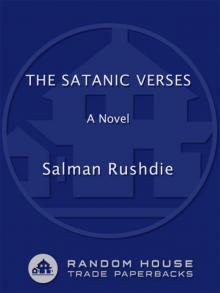 The Satanic Verses: A Novel
The Satanic Verses: A Novel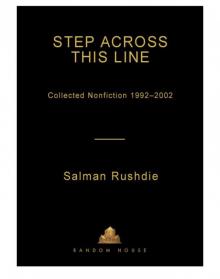 Step Across This Line
Step Across This Line East, West
East, West